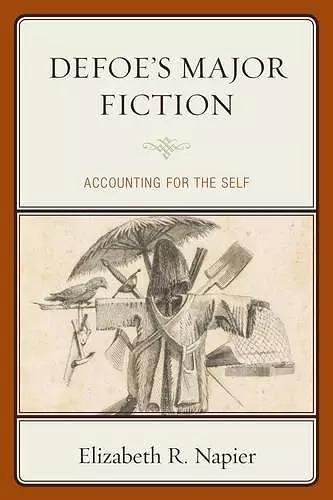Defoe’s Major Fiction
Accounting for the Self
Format:Hardback
Publisher:Rowman & Littlefield
Published:28th Jan '16
Currently unavailable, and unfortunately no date known when it will be back
This hardback is available in another edition too:
- Paperback£36.00(9781611496154)

This book focuses on the pervasive concern with narrativity and self-construction that marks Defoe’s first-person fictional narratives. Defoe’s fictions focus obsessively and elaborately on the act of storytelling—not only in his creation of idiosyncratic voices preoccupied with the telling (and often the concealing) of their own life stories but also in his narrators’ repeated adversion to other, untold stories that compete for attention with their own. Defoe’s narratives raise profound questions about selfhood and agency (as well as demonstrate competing attitudes about narration) in his fictive worlds. His canon exhibits a broad range of first-person fictional accounts, from pseudo-memoir (A Journal of the Plague Year, Memoirs of a Cavalier) to criminal autobiography (Moll Flanders) to confession (Roxana), and the narrators of these accounts (secretive, compulsive, fractive) exhibit an array of resistances to the telling of their life stories. Such experiments with narration evince Defoe’s deep involvement in projects of self-description and -delineation, as he interrogates the boundaries of the self and dramatizes the arduousness of self-accounting. Defoe’s fictions are emphatically consciousness-centered and the significance of such a focus to the development of the novel is patently as great as is his “realistic” style. Defoe’s narrative project, in fact, challenges current views on the moment at which inwardness and interiority begin, as Lukács argued, to comprise the subject matter of the novel, implicitly attributing to identity and consciousness a place of signal and complex importance in the new genre.
Napier's study of Daniel Defoe is literary criticism at its best: attentive to text, informed (but not dominated) by theory, written in lucid—indeed lyrical—prose. Napier begins with Defoe's complicated invocations of genre in the major fiction. Spiritual autobiography jockeys for interpretive dominance with picaresque fiction in Robinson Crusoe; criminal biography wars with conduct literature for narrative control of Moll Flanders and Roxana. Such generic instability demonstrates the difficulty of telling a story of self, a point further emphasized by accounts that are changed in the retelling or that never get fully told in the first place. From the first chapter's introduction of the problem of the narrative (and narrating) self, Napier moves on to chapters centered on dominant versions of the self in Defoe: the performing self, the compulsive self, the divided self. Each chapter provides ample evidence that the problematic of accounting for the self in these various ways is evident in all of Defoe's major fiction, though, predictably, Robinson Crusoe, Moll Flanders, and Roxana receive the most detailed attention. Napier's elegant, comprehensive, judicious study fully convinces that accounting for the self is a central concern of Defoe's major fiction. Summing Up: Essential. Lower-division undergraduates and above. * CHOICE *
Throughout this study, Napier’s knowledge of scholarship on Defoe’s major fictions and her breadth of commentary on novel theory as it relates to narration and the construction of the self are as thorough asthey are comprehensive.... Ultimately her argument is strong and clear... [T]his work is a valuable contribution to the study of Defoe’s major fiction. * Eighteenth-Century Fiction *
- Winner of Choice Outstanding Academic Title 2016
ISBN: 9781611496130
Dimensions: 239mm x 159mm x 18mm
Weight: 399g
190 pages